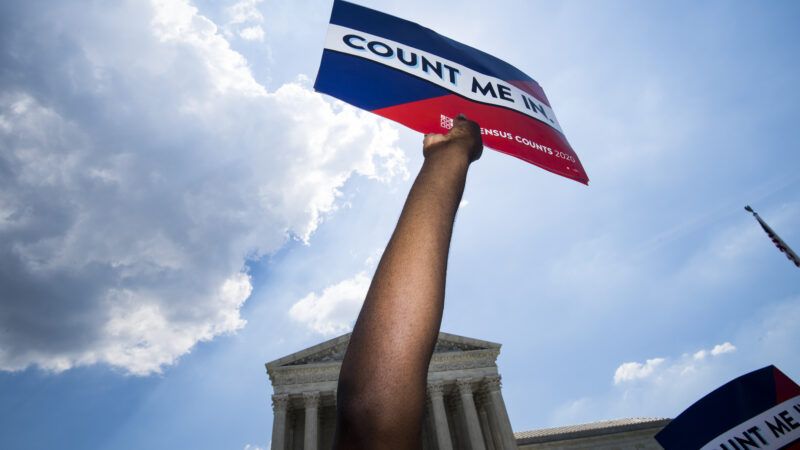Trump Must Actually Exclude Undocumented Immigrants From the Census Before He Can Be Sued for Doing That, SCOTUS Rules
The Supreme Court dismissed a challenge to Trump's plans for being "premature" until the administration actually does what it says it plans to do.

The Supreme Court won't stop the Trump administration from excluding undocumented immigrants in this year's census—at least not until the administration officially does it.
The high court on Friday dismissed a challenge that sought to prevent the White House from excluding undocumented immigrants in the final numbers that will be used to apportion congressional seats. In an unsigned opinion, the court said the Trump v. New York case was "premature" and that plaintiffs lacked standing to seek a legal remedy because the census has not yet been finalized.
"This case is riddled with contingencies and speculation that impede judicial review," the justices wrote. They noted that Trump "has made clear his desire" to exclude undocumented immigrants from the census, but that the court would have to wait until the plan was implemented before determining its constitutionality.
Justices Stephen Breyer, Sonia Sotomayor, and Elena Kagan filed a joint dissenting opinion arguing that the court should be able to rule on the merits of the case now, given the potential harms created if Trump moves ahead with implementing the changes.
"This fight isn't over," the American Civil Liberties Union, one of several groups involved in the lawsuit against the Trump administration, said in a statement. "If this policy is actually implemented, we'll see them right back in court."
Cutting undocumented immigrants out of the once-per-decade headcount of all Americans has important ramifications for the allocation of congressional seats and Electoral College votes, potentially shifting political power away from states that have larger immigrant populations. The U.S. Constitution requires only that the government count the "whole number of persons" every 10 years, and throughout history that has been interpreted to mean all people, including both citizens and noncitizens.
Until now. In July, Trump issued an executive order instructing the Commerce Department, which handles the census, to "exclude from the apportionment base aliens who are not in a lawful immigration status." In the order, Trump argued that states have a perverse incentive to ignore federal immigration laws because they gain more congressional seats and political influence by having larger populations of undocumented immigrants.
On three occasions, lower federal courts told the Trump administration that it wasn't allowed to exclude undocumented immigrants from the census.
Against that background, then, Friday's ruling at the Supreme Court is something of a win for Trump—one that opens the door to changing how congressional and Electoral College power is distributed, even if only just a crack.
"The President now has the green light to try his hand at manipulating the count, and the Supreme Court—and the other federal courts—can only intervene if he actually does it (or perhaps if he clarifies what he's going to do)," writes Thomas Wolf, a senior counsel and reapportionment expert for the Brennan Center, a nonprofit legal center.
Friday's ruling "leaves the door open for any state that ends up losing congressional representation as a result of Trump's plan to return to court at the end of the reapportionment process," writes SCOTUSblog's Amy Howe.
The right thing for the administration to do, of course, would be to drop this attempt at refusing to recognize the existence of individuals who are obviously residents of the United States and who are very much subject to the authority of the federal government. That, however, seems unlikely.
As the clock winds down on Trump's time in office, what happens with the final stages of the census could be one of the administration's most lasting impacts. Ten years' worth of congressional redistricting and the next two presidential elections could be influenced by what the Trump administration decides to do next—and by what happens when and if the Supreme Court revisits this matter in the near future.


Show Comments (82)